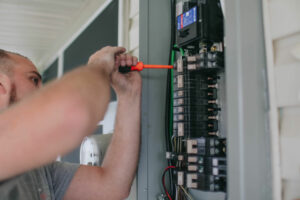At Right Touch Electrical in Houston, TX, we know that recognizing the signs of a bad circuit breaker is crucial for maintaining the safety and functionality of your electrical system. From frequent tripping to unusual sounds and visual indicators, understanding these signs can help you address issues promptly and prevent potential hazards. Here’s what you need to know:
maintaining the safety and functionality of your electrical system. From frequent tripping to unusual sounds and visual indicators, understanding these signs can help you address issues promptly and prevent potential hazards. Here’s what you need to know:
- Frequent Tripping: One of the most common signs of a bad circuit breaker is frequent tripping. If your circuit breaker trips frequently, it indicates that it’s struggling to handle the electrical load, possibly due to an overload or short circuit.
- Tripped Breaker Will Not Reset: If you attempt to reset a tripped circuit breaker, but it immediately trips again or refuses to reset at all, it could indicate a faulty breaker that needs replacement.
- Burn Marks or Smell: Visual signs of burn marks or a burning smell around the circuit breaker panel are clear indications of overheating or electrical arcing. These signs should be taken seriously and addressed promptly to prevent potential fire hazards.
- Buzzing or Crackling Sounds: Unusual sounds such as buzzing, crackling, or sizzling coming from the circuit breaker panel could signal loose connections, faulty wiring, or arcing inside the breaker. These sounds indicate potential electrical hazards that require immediate attention.
- Hot to the Touch: A circuit breaker that feels unusually hot to the touch is another warning sign of overheating. Heat buildup can occur due to overloaded circuits, poor connections, or faulty breakers, all of which pose fire risks if left unchecked.
What is a Circuit Breaker?
A circuit breaker is a crucial component of your electrical system designed to protect against electrical overloads and short circuits. It acts as a safety mechanism by interrupting the flow of electricity when it detects abnormalities in the circuit.
Can You Repair a Bad Circuit Breaker?
While some electrical components can be repaired, circuit breakers are typically replaced rather than repaired. Attempting to repair a faulty circuit breaker can be dangerous and may not fully address the underlying issue. It’s best to consult an electrician at Right Touch Electrical in Houston, TX, to assess the condition of the breaker and determine the appropriate course of action.
How Do I Know If I Need To Replace The Circuit Breaker Or The Whole Circuit Panel?
Determining whether you need to replace a circuit breaker or the entire circuit panel depends on various factors, including the age of your electrical system, the severity of the problem, and the condition of the components. Here are some indicators that may help you decide:
- Age of the Electrical System: If your electrical system is outdated and the circuit breaker panel is several decades old, it may be more practical to replace the entire panel rather than just individual breakers.
- Frequent Breaker Failures: If you’re experiencing frequent tripping or failures of multiple circuit breakers within a short period, it could indicate underlying issues with the circuit panel itself.
- Panel Damage or Corrosion: Visual inspection of the circuit breaker panel is essential. If you notice signs of corrosion, rust, or physical damage to the panel enclosure, it may indicate deterioration that warrants panel replacement.
- Insufficient Capacity: If you’re planning to upgrade your electrical system to accommodate increased power demands, such as adding new appliances or expanding your property, you may need to replace the circuit panel with a larger capacity panel.
- Professional Assessment: Consulting an electrician at Right Touch Electrical, is crucial for accurately assessing the condition of your circuit breaker panel and determining the most appropriate course of action.
Why Addressing Bad Circuit Breakers Is Important:
Ignoring signs of a bad circuit breaker can lead to various safety risks, including electrical fires, property damage, and electrical shock hazards. Promptly addressing these issues not only ensures the safety of your home or business but also prevents costly repairs and potential downtime due to electrical failures.
How Right Touch Electrical Can Help:
At Right Touch Electrical, our team of experienced electricians specializes in diagnosing and repairing electrical issues, including faulty circuit breakers. Whether you’re experiencing frequent tripping, unusual sounds, or visual signs of damage, we have the expertise to identify the root cause and provide effective solutions.
Contact Us Today For Circuit Repair & Installation:
If you’ve noticed any signs of a bad circuit breaker in your home or business, don’t hesitate to contact Right Touch Electrical for professional assistance. Our priority is your safety and satisfaction, and we’re here to provide reliable electrical services tailored to your needs.
Remember, when it comes to electrical issues, it’s always better to be safe than sorry. Contact Right Touch Electrical today to schedule an inspection and ensure the safety and functionality of your electrical system.
FAQs – Signs Of A Bad Circuit Breaker
Can a circuit breaker be repaired instead of replaced?
A: While some minor issues with circuit breakers can be repaired, it’s often safer and more cost-effective to replace a faulty circuit breaker rather than attempting repairs. Circuit breakers are complex electrical components, and attempting DIY repairs can pose safety risks and may not fully address underlying issues.
What should I do if I suspect I have a bad circuit breaker?
A: If you suspect you have a bad circuit breaker, it’s essential to address the issue promptly to prevent potential safety hazards and damage to your electrical system. Contact an electrician at Right Touch Electrical in Houston, TX, for professional inspection and diagnosis. Our experienced technicians can assess the condition of your circuit breakers and provide appropriate solutions.
Are all circuit breakers the same, or are there different types?
A: There are various types of circuit breakers available, each designed for specific applications and electrical loads. Common types include standard circuit breakers, ground fault circuit interrupters (GFCIs), and arc fault circuit interrupters (AFCIs). The type of circuit breaker needed depends on factors such as the electrical system’s voltage, current, and the level of protection required.
How long do circuit breakers typically last before needing replacement?
A: The lifespan of a circuit breaker depends on factors such as usage, environmental conditions, and the quality of the breaker itself. In general, circuit breakers can last anywhere from 15 to 30 years or more with proper maintenance and care. However, if you’re experiencing frequent issues or signs of wear and tear, it may be time to consider replacing older circuit breakers.
Can a bad circuit breaker cause other electrical problems in my home or business?
A: Yes, a bad circuit breaker left unrepaired can potentially lead to other electrical issues if left unresolved. Circuit breakers protect against electrical overloads and short circuits, so a faulty breaker may fail to perform its intended function, leading to safety hazards such as electrical fires, damage to appliances, and power outages. It’s essential to address bad circuit breakers promptly to prevent further complications.
